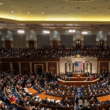It is not a secret that Republicans chastened by Hispanic support for Barack Obama only reluctantly support immigration reform. The party is, in fact, deeply anti-immigrant.
“If amnesty goes through, America becomes California and no Republican will ever win another election,” right-wing columnist Ann Coulter warned in a column in March. Coulter speaks for the Republican base and the Tea Party Republicans in Congress.
| With amnesty, no Republican will ever win another election. |
The Obama administration spent $18 billion on border security last year and deported a record 400,000 undocumented immigrants. Yet to accommodate nativists, Democrats in the Senate “Gang of Eight” have agreed to a border-security bill in which immigration reform is an afterthought.
Republicans continue to define security measures as a predicate to immigration reform, demanding: 90 percent apprehension of border crossers; a Border Commission to implement a Southern Border Strategy; funding for 3,500 new customs officers; deployment of the National Guard to build border fences, and surveillance drones. All written in to the original draft to cultivate support of the minority party in the Senate.
And as the bill is marked up, nothing moves until Homeland Security certifies to the Congress that a Comprehensive Border Security Plan and a Southern Border Fencing Strategy plan are in place.
Attainment of border-security provisions then “trigger” the process of status legalization, even if the cat is already in the bag. Unauthorized immigrants must prove they have been in the U.S. since Dec. 31, 2013, before applying for legalization.
Applicants for Registered Provisional Immigrant status start by paying a $500 “penalty fee” plus the yet-to-be-calculated cost of processing applications. If fees paid by students eligible for DREAM Act status are a measure of administrative costs, RPI applicants will pay an additional $500 processing fee.
Shifting costs from the taxpayer to the immigrant is reasonable. But added to a $500 penalty, an initial buy-in of $1,000 imposes a burden on a low-wage workforce that according to Pew Research represents 25 percent of the nation’s farmworkers; 19 percent of building and maintenance workers; 17 percent of construction workers; and 12 percent of food preparation and service workers. The initial $1,000 in fees seems ever more burdensome considering that over half of undocumented families currently working in the U.S. earn less than $20,000 a year.
The legislation also requires the Internal Revenue Service to devise a formula that will allow for payment of back taxes by all unauthorized immigrants who apply to normalize their status.
After 10 years as a Registered Provisional Immigrant, the path to citizenship begins with another $1,000 to apply for a green card. Three years after receiving green cards, immigrants can apply for citizenship, and the Californication of America feared by Republican nativists begins.
Lou Dubose is the editor of The Washington Spectator.





